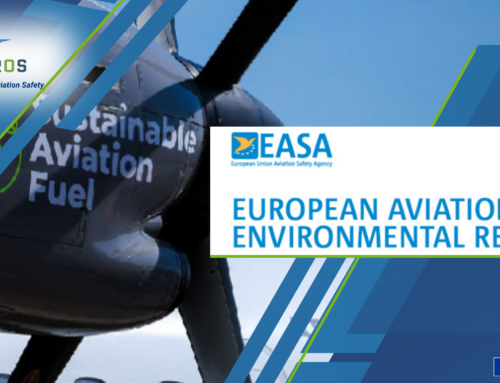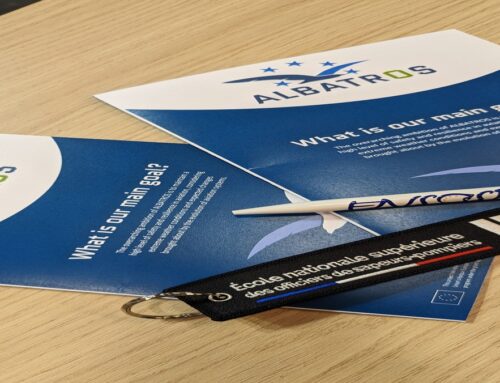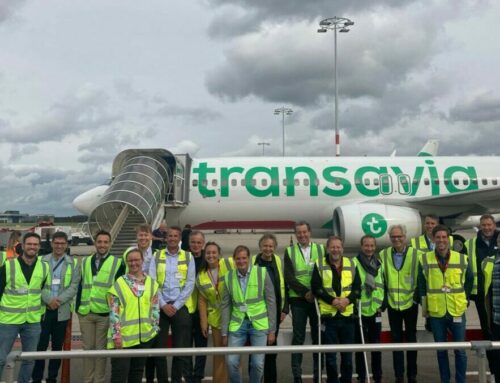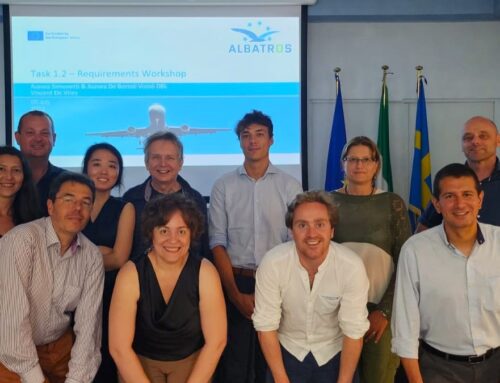On October 29th and 30th, 2024, the ALBATROS consortium gathered for its 2nd Yearly Meeting in Amsterdam, hosted by the NLR – Royal Netherlands Aerospace Centre, one of Europe’s leading research institutes and the coordinating organization for the project.
The meeting brought together 21 partners from across the aviation sector, both in person and virtually, for two days of presentations, workshops, and strategic discussions. The goal? To reflect on the progress made, tackle emerging challenges, and align efforts as the project moves forward.
A Platform for Collaboration and Progress
This year’s meeting wasn’t just about updates—it was a dynamic exchange of ideas. Combining the annual review with hands-on workshops, the event provided an opportunity to dive deeper into the project’s technical advancements and discuss the future of aviation safety in the face of challenges like extreme weather and the shift to sustainable energy systems.
Day 1: Presentations, Insights, and Networking
The first day kicked off with a warm welcome at the NLR reception hall from project coordinator Vincent Wilod Versprille, setting an engaging and productive tone for the meeting. The agenda then moved into presentations from project leaders across various Work Packages (WPs), each focusing on a key element of the ALBATROS mission:
- Concept Development: Jin Choi, Rombout Wever, and Henk Hesselink from NLR provided insights into the foundational work guiding the project’s innovative solutions.
- Safety and Resilience: Gerard van Es from NLR shared progress on strengthening aviation’s resilience and its ability to withstand and recover from disruptions.
- Survivability: Emmanuel Laroche from ONERA explored the latest advancements in passenger safety during emergencies.
- Decision Support for Crises: Yves Günther from DLR presented tools designed to assist decision-makers in navigating critical events.
- Validation and Demonstration: Jan-Daan Maasland from Rotterdam Airport (RTHA) provided updates on testing protocols and implementation plans.
- Dissemination and Training: Jean Baptiste Shamuana from Deep Blue outlined strategies for effectively communicating the project’s findings to stakeholders and the broader aviation community, while Jaafar Blaibel and Eric Schoonderwoerd from JAA Training updated the team on the latest developments in training course implementation.
These discussions not only showcased the consortium’s achievements but also laid the groundwork for the next phase of the project.
The day concluded with a social dinner in the heart of Amsterdam, offering a chance to unwind and strengthen connections. Moments like these remind us that collaboration thrives when people come together, both in and outside of the meeting room.
Day 2: Workshops and Strategic Discussions
The second day shifted gears, focusing on hands-on workshops and detailed planning. Three parallel sessions addressed key technical aspects:
- Developing a Digital Toolkit for Emergency Decision-Making: Led by Aurora De Bortoli Vizioli (DBL), this session explored tools to enhance crisis management capabilities.
- Coordination Workshop for WP5: Facilitated by Jan-Daan Maasland (RTHA), this workshop focused on validating and demonstrating project solutions.
- Resilience for Cybersecurity (Task T2.5): Christopher Scherb (FHNW) led a deep dive into strengthening aviation systems against cyber threats.
The day also included an Advisory Board Meeting, where distinguished experts—Alex Milns (EUROCAE), Jan Huizing (ILT Aerosensing), and Michel Piers (Future Sky Safety)—shared thoughtful recommendations. Their insights will be instrumental in shaping the next steps of the project.
What Makes ALBATROS Special?
ALBATROS stands for Advanced systems and soLutions for Better practices AgainsT hazaRds in the aviatiOn System. The project addresses critical challenges in aviation, such as managing extreme weather events and adapting to new fuels and energy systems like hydrogen and electric propulsion.
Through its innovative approach, ALBATROS aims to:
- Improve hazard prediction, detection, and mitigation.
- Enhance emergency preparedness and response, both on the ground and in the air.
- Build resilience in the face of emerging threats, from climate changes to cybersecurity risks.
Looking Ahead
The meeting wrapped up with a clear vision for the future. As we move into 2025, the focus will shift toward demonstrations to validate the solutions developed so far. These real-world tests will mark a crucial step in bringing the project’s innovations to life.
A heartfelt thanks to NLR for hosting this event and to all consortium members who continue to drive this revolutionary project forward. Your dedication is shaping the future of aviation safety and resilience.
ALBATROS Consortium Partners:
Aegean Airlines, Athens International Airport (AIA), Airbus, ANA, CIRA (Italian Aerospace Research Centre), the German Aerospace Center (DLR), Deep Blue (DBL), ENSOSP (French National Fire Officers Academy), the University of Applied Sciences and Arts Northwestern Switzerland (FHNW), the Finnish Meteorological Institute (FMI), JAA Training Organisation (JAATO), the Royal Netherlands Aerospace Centre (NLR), ONERA (French Aerospace Lab), the University of Oulu, Pipistrel Aircraft, Rotterdam The Hague Airport (RTHA), Schiphol Airport, Serveo, Skyway ANS, and Somni Solutions.
If you’re as passionate about the future of aviation as we are, follow ALBATROS on social media to stay updated on our journey.
#ALBATROSProject
Together, we are building a safer, more resilient aviation system for tomorrow.







